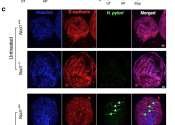Helicobacter creates immune system blind spot
The gastric bacterium H. pylori colonizes the stomachs of around half the human population and can lead to the development of gastric cancer. It is usually acquired in childhood and persists life-long, despite a strong inflammatory ...
Mar 13, 2018
0
416









